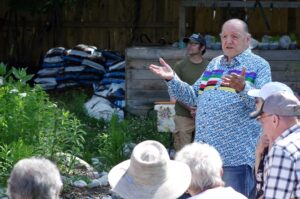Netmizaaggamig Nishnaabeg Elder imparts teachings at Learning Indigenous Stewardship gathering

By Rick Garrick
THUNDER BAY — Netmizaaggamig Nishnaabeg Elder Tony DePerry recently shared stories and teachings about nature during the Learning Indigenous Stewardship gathering on July 13 at the Adelaide Butterfly Garden in Thunder Bay.
“I’m willing to help the people understand our vegetation, our way of life, the earth, the water,” Elder DePerry says. “It’s kind of a responsibility I have to share that the [Indigenous] people had that authority. I had all good responses because the people respected that idea that someone was able to share with them about the beautiful things that come out of nature.”
Elder DePerry says the Adelaide Butterfly Garden, which is located on the north side of Boulevard Lake alongside a multi-use trail, is very beautiful.
“I noticed the sweetgrass, the sage, the cedar growing all over the place and all the bushes,” Elder DePerry says. “Everything that they have, the [Indigenous] people used to use that for medicines.”
Elder DePerry says his teachings come from nature and the Elders.
“My Elders, I respected them for what they say and what they do, how they help us to understand things, how they help us to understand what it is to be kind to people, to be kind to a person, to be responsible for many things that we do in life,” Elder DePerry says.
Elder DePerry says he grew up on the land and didn’t speak English until he was nine years old.
“I learned to listen, I learned to be patient, I’m not in a hurry, I don’t want to do it any quicker, any faster,” Elder DePerry says. “We, as Anishinabek people, we believe in the fish, we believe in wildlife, all our animals, we believe in them because they know more than we do.”
Elder DePerry says nature is trying to teach people something with the changing weather conditions.
“Nature is trying to tell us something but we’re not listening,” Elder DePerry says. “We’re too much with a priority basis, we’re too much in a hurry, we don’t have enough patience to sit back, enjoy and accept what nature has done for us.”
Leola Palmer, a volunteer at the Adelaide Butterfly Garden and Red Rock Indian Band citizen, says it was important to have Elder DePerry’s perspective on agriculture, pollinators, and land stewardship at the gathering.
“The Indigenous peoples have been stewards for thousands of years — they had it right and people now seem to have it wrong,” Palmer says. “So I’m just hoping he can add and promote like we do [about] what changes we need to make and what we can do to help.”
Palmer says she began volunteering at the garden after it was started by the late Dan Fulton.
“He used to do a program about fostering monarch butterflies, so he would put little kits together, caterpillars and milkweed and he would answer any type of questions,” Palmer says. “He also created a Facebook page called Urban Greenscapes, which I still take care of. It’s got over 2,000 members on that page and it’s a great place to ask questions, learn and [educate], and kind of promote what we do.”
John Walas, who spoke about insects and butterflies during the gathering, says it is important to understand the connection between insects, plants and the land.
“One of the things I did express is the fact that we have outbreaks, but those aren’t necessarily traumatic experiences, those are just a part of nature and part of the cycle of life,” Walas says. “Now with the forest tent caterpillar coming around, they’re eating the leaves but with the whole process, their excretions go onto the ground and provide fertilizer and they provide food for the birds and the other insects that feed on them.”
Walas says the forest tent caterpillars also open up the forest canopy and allow light to shine upon plants on the ground.
“The plants on the ground that wouldn’t normally get that light get a chance at life and get a chance to grow,” Walas says. “And the fertilizer that the caterpillars drop helps them grow that much faster, so it’s the circle of life that allows all of this to happen.”


